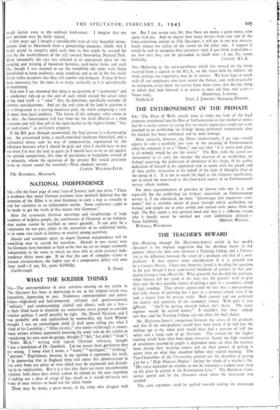THE ENTHRONEMENT OF THE PRIMATE
SIR,—The Dcan of Wells would seem to make too little of the legal elements introduced into the Rite of Inthronisation in late mediaeval times; but he is surely correct in saying that too much importance ought not to he attached to an archbishop (or bishop) being enthroned immediately after his election has been confirmed and he done homage.
More seriously, however, the Dean—inadvertently, I am sure—would appear to take a painfully low view of the meaning of Enthronement when he compares it to a " Show," and says that " if it never took place at all nobody would be any the worse." The Rite, with the actual en- thronement at its core, has become the occasion of an archbishop (or bishop) receiving the profession of obedience of his clergy, of the public dedication of himself to his appointed task in union with his people and of their public invocation in his behalf of the help of Almighty God in the doing of it. It is not so much the legal as the religious significance, not so much the man-ward as the God-ward aspect, of an Enthronement service which matters.
For most representatives of province or diocese who join in it, and especially for the archbishop (or bishop) concerned, an Enthronement service is, I am convinced, no mere " picturesque and impressive cere- mony," but a veritable means of grace through which archbishop (or bishop) and people are at once united and endued with power ftom on high. The Rite meets a real spiritual need and that is a sufficient reason why it should never be omitted nor even indefinitely delayed.—


























 Previous page
Previous page